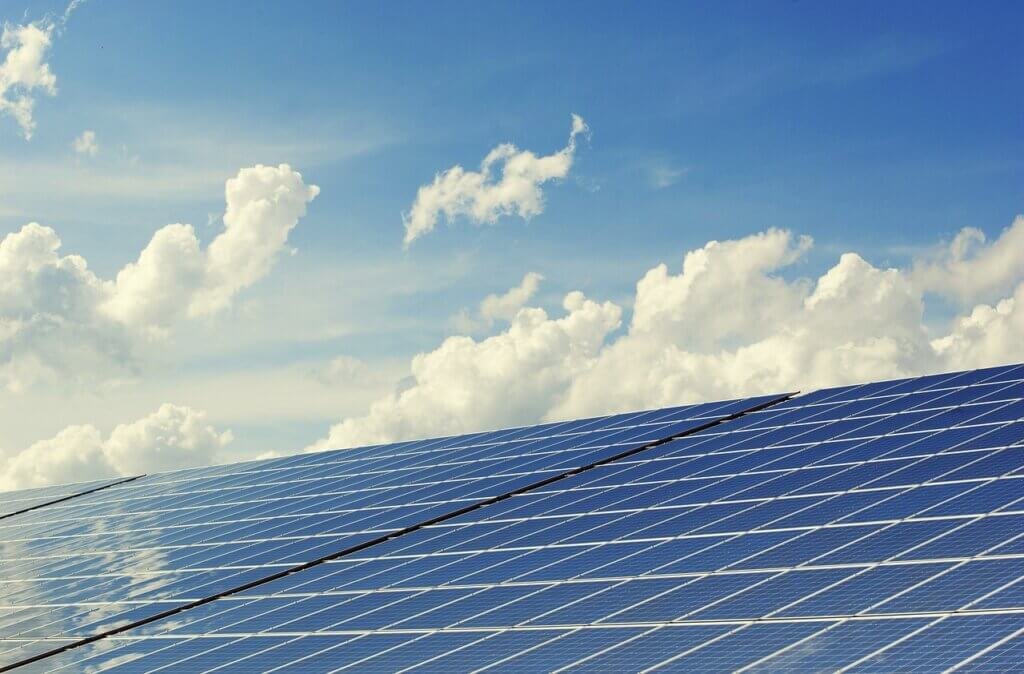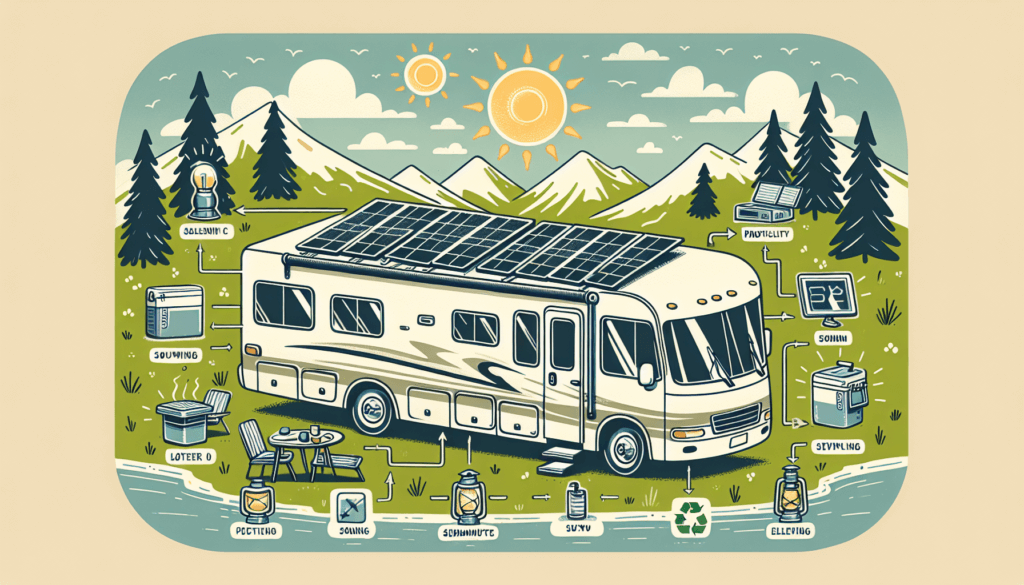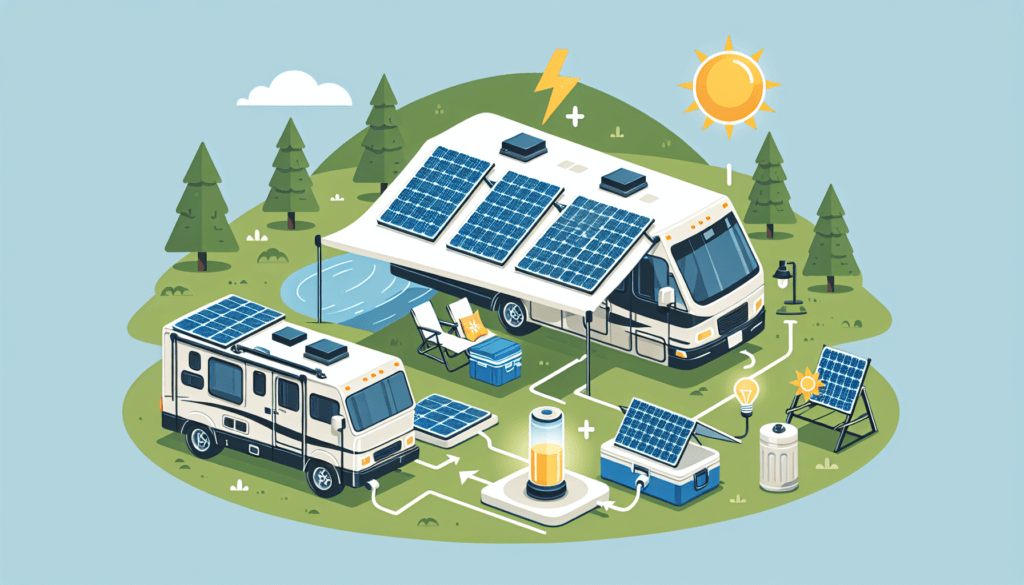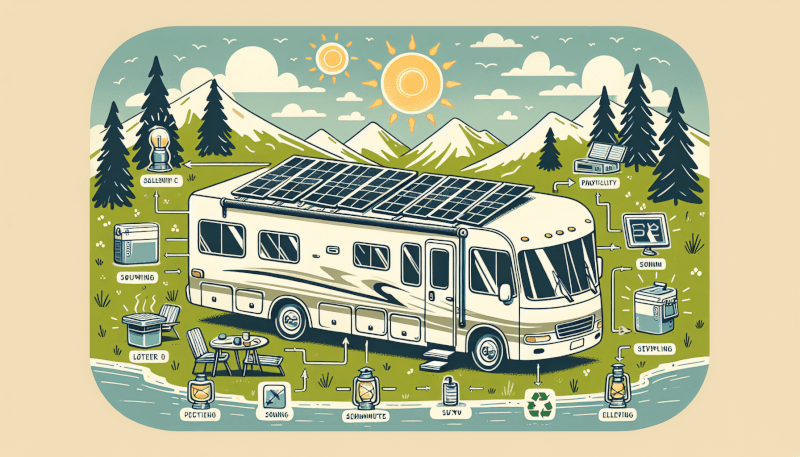In the exciting world of RV camping, having a reliable source of power is essential. And what better way to harness that power than with a camping solar battery? This article explores the importance of storing and using solar power for RV camping. From the convenience of being able to charge your devices to the environmental benefits of harnessing clean energy, discover how a camping solar battery can enhance your outdoor adventures.

Understanding RV Camping Solar Battery
What is an RV camping solar battery?
An RV camping solar battery is a specialized type of battery designed to store and provide power for recreational vehicles (RVs) when they are not connected to an external power source. It is an essential component for RV campers who want to utilize solar energy as a renewable and sustainable power source during their trips.
Why is it important for RV camping?
Having a reliable RV camping solar battery is crucial for several reasons. Firstly, it allows campers to have access to electricity even when they are far away from electrical hookups. This provides them with the convenience of lights, appliances, and other essential electrical devices, making their camping experience more comfortable and enjoyable. Secondly, using solar power helps reduce the environmental impact of RV camping by utilizing a clean and renewable energy source. Lastly, relying on solar power can also save campers money in the long run by reducing or eliminating the need for generator use or campground fees.
How does it work?
An RV camping solar battery works by converting sunlight into electrical energy through the use of solar panels. These panels contain solar cells that absorb sunlight and convert it into direct current (DC) electricity. The DC electricity produced by the solar panels is then stored in the battery, which can be used to power various devices and appliances in the RV. To make the energy usable for RV camping, an inverter is often used to convert the DC electricity into alternating current (AC) electricity.
Different types of RV camping solar batteries
There are several different types of RV camping solar batteries available on the market. The most commonly used type is the lead-acid battery, which is affordable and reliable. However, it requires regular maintenance and has a limited lifespan. Another type is the lithium-ion battery, which is more expensive but offers higher energy density, longer lifespan, and lightweight construction. Lithium-ion batteries are becoming increasingly popular for RV camping due to their superior performance and convenience. Other battery types, such as gel batteries and AGM batteries, are also available but are less common in the RV camping community.
Choosing the Right Solar Battery for Your RV
Determining your power needs
Before choosing a solar battery for your RV, it is important to determine your power needs. This involves considering the electrical appliances and devices you will be using during your trips and estimating their energy consumption. Make a list of all the items you plan to power, their wattage ratings, and the number of hours you intend to use them. This will give you an idea of the total energy requirements and help you select a solar battery that can meet your needs.
Considering battery capacity and size
Battery capacity refers to the amount of electrical energy the battery can store and provide. It is measured in ampere-hours (Ah) or kilowatt-hours (kWh). When choosing a solar battery for your RV, it is essential to consider its capacity to ensure it can sustain your power needs for an extended period of time. Additionally, you should also consider the physical size and weight of the battery to ensure it can fit within the limited space available in your RV.
Evaluating battery lifespan and durability
The lifespan and durability of a solar battery are crucial factors to consider when making a choice. Lead-acid batteries generally have a shorter lifespan compared to lithium-ion batteries, which can last significantly longer with proper care. In terms of durability, consider factors such as resistance to vibration, shock, and extreme temperatures, as these are common challenges in the RV camping environment. Choosing a battery with a robust construction and a reputable brand can help ensure its long-term reliability.
Exploring advanced features and technologies
Some solar batteries come with advanced features and technologies that can enhance their performance and functionality. For example, some batteries have built-in battery management systems (BMS) that protect against overcharging, overdischarging, and other potentially damaging conditions. Others may have Bluetooth or Wi-Fi connectivity, allowing you to monitor and control the battery’s status remotely via smartphone apps. While these features may come at an additional cost, they can provide added convenience and peace of mind during your RV camping adventures.

Sizing and Installing Your RV Camping Solar System
Calculating your energy usage
To determine the appropriate size for your RV camping solar system, you need to calculate your energy usage. This involves estimating the total amount of energy required per day by considering the wattage ratings and usage times of your electrical devices and appliances. By adding up the energy consumption of each item, you can determine the daily energy demand, which will help you size your solar system and battery capacity accordingly.
Determining optimal solar panel size
The size of the solar panels you require depends on your energy consumption and the amount of sunlight available in your camping destinations. Solar panels are generally rated based on their power output in watts. To calculate the optimal size of your solar panel array, divide your daily energy demand (in watt-hours) by the average daily sunlight hours in your area. This will give you an estimate of the total wattage rating needed for your solar panels.
Selecting charge controllers and inverters
Charge controllers and inverters are essential components in an RV camping solar system. Charge controllers regulate the amount of electrical current flowing from the solar panels to the battery, preventing overcharging and optimizing charging efficiency. Inverters convert the DC electricity stored in the battery into AC electricity for powering household appliances. When choosing these components, ensure that they are compatible with your solar panel and battery specifications and have the necessary power ratings to handle your energy demands.
Wiring and installation best practices
Proper wiring and installation are crucial for the safety and efficiency of your RV camping solar system. It is recommended to seek professional help or consult a reliable guide to ensure that the wiring is done correctly and meets all safety standards. When installing the solar panels, consider the orientation and tilt angle to maximize sunlight absorption. Mounting the panels securely and using appropriate wiring protection can help prevent damage during travel and ensure the longevity of your solar system.
Storing Solar Power in Your RV Camping Solar Battery
Understanding battery charging processes
Solar battery charging involves the transfer of electrical energy from the solar panels to the battery for storage. The charging process typically consists of three stages: bulk charging, absorption charging, and float charging. During bulk charging, the battery is charged at maximum current until it reaches a predetermined voltage. This is followed by absorption charging, where the charging voltage is held constant while the current decreases. Finally, float charging maintains the battery’s voltage at a lower level to prevent overcharging. Understanding these stages can help you monitor and optimize the charging process for your solar battery.
Maximizing solar energy capture
To maximize solar energy capture, it is important to position the solar panels in a location that receives the most sunlight throughout the day. Take into account any potential obstructions such as trees or buildings that may shade the panels and decrease their efficiency. Regularly clean the panels to remove any dirt or debris that can hinder sunlight absorption. Additionally, using solar panel tilt mounts can help optimize the panel angle for maximum energy capture based on the season and the latitude of your camping location.
Limitations and challenges in solar power storage
While RV camping solar batteries are an excellent option for storing solar power, there are some limitations and challenges to be aware of. One limitation is the finite capacity of the battery, which means it can only store a certain amount of energy at a time. This requires careful energy management and efficient power usage to ensure you don’t deplete the battery too quickly. Additionally, inclement weather conditions such as cloudy days can reduce the amount of solar energy harvested, affecting the battery’s charging capabilities. Being prepared for these challenges and having alternative power sources can help mitigate any potential issues.
Utilizing smart energy management systems
Smart energy management systems can help optimize the storage and usage of solar power in your RV camping solar battery. These systems use advanced algorithms and sensors to monitor the battery’s state of charge, energy consumption, and other relevant factors. With this information, they can automatically adjust the charging and discharging parameters to maximize the battery’s efficiency and lifespan. Some smart energy management systems also allow you to track your energy usage, set energy-saving preferences, and receive alerts about potential issues or maintenance requirements. Integrating such a system into your RV camping solar setup can provide added convenience and ensure optimal performance.

Maintaining and Caring for Your RV Camping Solar Battery
Regular battery maintenance tasks
To ensure the longevity and performance of your RV camping solar battery, regular maintenance is essential. Some key maintenance tasks include:
- Checking the battery’s state of charge regularly and recharging as needed.
- Cleaning the battery terminals to remove any corrosion or buildup.
- Inspecting the battery casing for any signs of damage or leaks.
- Checking and tightening the battery connections to prevent loose or corroded wires.
- Following the manufacturer’s guidelines for maintenance schedules and recommended procedures.
By following these maintenance tasks and any specific recommendations from your battery manufacturer, you can keep your RV camping solar battery in optimal condition.
Protecting against extreme temperatures
Extreme temperatures can have a significant impact on the performance and lifespan of your RV camping solar battery. High temperatures can accelerate the battery’s chemical reactions, leading to reduced capacity and shorter lifespan. On the other hand, extremely low temperatures can decrease the battery’s ability to hold a charge and may even cause irreversible damage. To protect your battery, try to park your RV in shaded areas or use reflective covers to minimize direct exposure to sunlight. If camping in frigid temperatures, insulate your battery with thermal blankets or foam to maintain a stable operating temperature.
Monitoring battery health and performance
Regularly monitoring your RV camping solar battery’s health and performance is crucial for detecting any potential issues or declining performance. Many solar batteries come with built-in battery management systems that provide information on battery voltage, state of charge, and overall health. If your battery does not have these features, you can use a multimeter or a battery monitor to measure its voltage and assess its charging and discharging capabilities. Tracking this information over time will help you identify any abnormal patterns and take appropriate action if necessary.
Replacing and recycling old batteries
Despite proper maintenance and care, RV camping solar batteries will eventually reach the end of their lifespan and need replacement. When it is time to replace your battery, it is important to follow proper disposal and recycling procedures. Lead-acid batteries, for example, require special handling due to their lead content. Many retailers and battery manufacturers offer recycling programs, allowing you to return your old battery and ensure it is disposed of in an environmentally responsible manner. By recycling your old batteries, you contribute to the conservation of resources and the reduction of hazardous waste.
Efficient Energy Usage in Your RV
Optimizing appliance and lighting choices
To maximize the efficiency of your RV camping solar system, it is important to choose energy-efficient appliances and lighting options. Look for appliances that are ENERGY STAR certified, as they are designed to consume less energy without compromising performance. LED lighting is highly recommended for its energy efficiency and long lifespan. By selecting energy-efficient options, you can minimize your energy consumption and maximize the available power from your solar battery.
Implementing energy-saving practices
There are several energy-saving practices that you can implement while using your RV camping solar system. Some tips include:
- Use natural lighting whenever possible to reduce reliance on artificial lighting.
- Minimize phantom loads by unplugging devices or using power strips with on/off switches.
- Opt for energy-saving modes or settings on your electronic devices.
- Adjust the thermostat to maintain a comfortable temperature without excessive power usage.
- Limit the use of power-hungry appliances such as hairdryers or electric heaters.
By adopting these practices, you can significantly reduce your energy consumption and increase the time between battery recharges.
Using energy-efficient RV camping accessories
In addition to appliances and lighting, there are energy-efficient accessories specifically designed for RV camping that can further optimize your energy usage. Some examples include:
- Solar-powered LED lanterns for outdoor lighting.
- Solar-powered fans or ventilation systems to reduce reliance on air conditioning.
- Portable solar panels or solar-powered battery chargers for smaller devices.
- Energy-efficient portable refrigerators or coolers for food storage.
These accessories not only reduce your energy consumption but also provide added convenience and mobility during your RV camping trips.
Managing power consumption on the road
Managing power consumption while on the road is crucial for optimizing your RV camping solar battery’s performance. Here are some tips to help you manage your power consumption effectively:
- Plan your route and campsites based on the availability of solar exposure to ensure sufficient charging opportunities.
- Prioritize essential power needs over non-essential ones to conserve energy.
- Make use of rest stops or campground facilities for energy-intensive tasks such as laundry or charging larger devices.
- Consider installing an energy monitor or control system to track your real-time power usage and identify opportunities for improvement.
By being mindful of your power consumption and implementing these strategies, you can prolong your battery’s runtime and maximize your solar power usage during your RV camping adventures.

Troubleshooting Common Issues with RV Camping Solar Battery
Identifying and resolving charging problems
If you encounter charging problems with your RV camping solar battery, there are a few common issues to investigate. Check for loose or corroded connections between the solar panels, charge controller, and battery. Verify that the solar panels are receiving sufficient sunlight and are not obstructed by shade or debris. Inspect the charge controller for any error codes or malfunctions. If you are unable to identify and resolve the issue, consult the manufacturer’s documentation or seek professional assistance to troubleshoot and repair the system.
Dealing with battery capacity issues
If you notice a gradual decrease in your RV camping solar battery’s capacity, there could be several factors at play. Check for sulfation, which is the buildup of lead sulfate crystals on the battery plates. Sulfation can reduce the battery’s capacity over time and may require desulfation or replacement. Additionally, excessive discharging or overcharging can lead to capacity loss. Properly maintaining the battery’s charge levels and preventing deep discharges can help mitigate this issue. If the decrease in capacity persists, it may indicate an aging battery that needs to be replaced.
Addressing wiring and connection faults
Wiring and connection faults can disrupt the proper functioning of your RV camping solar system. Check for loose or damaged wires, connectors, and fuses. Ensure that the wiring is properly insulated and protected from physical damage. If you suspect any faulty components, such as charge controllers or inverters, consult the manufacturer’s documentation for troubleshooting steps or contact their customer support for assistance. It is important to address wiring and connection faults promptly to prevent further damage or safety hazards.
Understanding system failures and safety precautions
In rare cases, RV camping solar systems may experience system failures that require immediate attention. These failures can be caused by component malfunctions, overvoltage or overcurrent conditions, or other technical issues. If you encounter a system failure, it is important to follow safety precautions and disconnect the electrical components from the battery and solar panels. Avoid touching any exposed wires and consult a professional or the system’s manufacturer for guidance on troubleshooting and resolving the issue safely.
Extended Boondocking with Solar Power
Utilizing solar power for extended off-grid stays
Solar power is particularly beneficial for extended off-grid stays, also known as boondocking. With a properly sized and installed RV camping solar system, you can rely on solar power to meet your energy needs without the need for external power sources. When boondocking, be mindful of your power usage and adjust your energy-saving practices to ensure you have sufficient power reserves to last throughout your stay. By utilizing solar power efficiently, you can enjoy a self-sustaining camping experience in remote and beautiful locations.
Tips for conserving energy during boondocking
Conserving energy is crucial during boondocking to make the most of your RV camping solar system. Some tips for conserving energy include:
- Minimize the use of high-energy appliances and opt for alternative methods, such as cooking over a campfire instead of using an electric stove.
- Use natural ventilation and fans instead of relying on air conditioning.
- Reduce water consumption to conserve energy used for water heating.
- Unplug electronics and appliances when not in use to eliminate phantom loads.
- Make use of daylight instead of relying on artificial lighting during daylight hours.
By implementing these energy-saving practices and being mindful of your power consumption, you can extend your off-grid stays and maximize the benefits of your RV camping solar system.
Expanding solar power capacity and storage
If you find that your RV camping solar system’s capacity and storage are insufficient for your boondocking needs, there are ways to expand your solar power capabilities. One option is to add more solar panels to your existing system to increase the amount of energy harvested. Another option is to incorporate additional batteries to expand your storage capacity. Before making any expansions, ensure that your charge controller and inverter can handle the increased capacity and consult a professional if necessary to ensure proper system integration and functionality.
Managing power reserves in isolated locations
When camping in isolated locations, it is important to manage your power reserves effectively. Ensure that you have a clear understanding of your battery’s state of charge and monitor your energy usage closely. Be mindful of any energy-intensive activities or devices that may drain your battery quickly. Plan your power usage carefully and prioritize essential needs to avoid running out of power unexpectedly. Additionally, consider bringing alternative power sources, such as portable generators or fuel cells, as backups in case of emergencies or extended periods of low solar exposure.

Exploring Alternative Power Sources for RV Camping
Supplementing solar power with generators
While solar power is a popular and eco-friendly choice for RV camping, there may be situations where it is not sufficient to meet your energy needs. In such cases, supplementing solar power with generators can provide an additional power source. Generators can produce a considerable amount of power and are useful in situations where the sunlight is limited for an extended period or when high power demand is required. However, generators consume fuel and produce noise and emissions, so it is important to use them responsibly and in accordance with local regulations.
Considering wind turbines for additional energy
In certain camping environments, utilizing wind power through wind turbines can be a viable option to supplement your RV camping power needs. Wind turbines harness the kinetic energy of the wind and convert it into electricity. They can be particularly useful in locations with consistent and strong winds. However, wind turbines require proper installation and maintenance, and their efficiency may vary depending on wind conditions. It is important to assess the feasibility and potential benefits of wind power based on your camping destinations and energy requirements.
Exploring fuel cell technologies for RVs
Fuel cell technologies have also emerged as a potential alternative power source for RV camping. Fuel cells generate electricity through an electrochemical process, utilizing hydrogen or other fuels to produce a clean and efficient energy source. Fuel cells have several advantages, including longer runtimes, quick refueling, and minimal noise and emissions. However, they can be expensive, and the availability of fuel infrastructure may vary depending on your camping destinations. Exploring fuel cell technologies can provide an insight into future power options for RV camping.
Hybrid systems: Combining multiple power sources
Hybrid systems that combine multiple power sources, such as solar, generators, wind turbines, and fuel cells, offer a flexible and robust solution for RV camping. These systems allow you to utilize different power sources based on availability, energy demand, and specific camping conditions. Hybrid systems often employ advanced energy management systems to intelligently switch between power sources and optimize energy usage. While hybrid systems can be more complex and expensive, they provide greater reliability and energy independence, making them suitable for campers with diverse energy needs and preferences.
Future Trends in RV Camping Solar Battery Technology
Advancements in solar cell efficiency
Advancements in solar cell technology continue to improve the efficiency and performance of RV camping solar batteries. Researchers and manufacturers are constantly developing new materials and designs to increase solar cell efficiency, allowing for greater energy generation even in limited sunlight conditions. These advancements will result in smaller and more efficient solar panels, enabling campers to generate more power from a smaller footprint.
Integration of artificial intelligence in energy management
The integration of artificial intelligence (AI) in RV camping solar battery technology holds significant potential for optimizing energy management. AI algorithms can analyze patterns in energy usage, weather conditions, and battery performance to make intelligent decisions on charging, discharging, and power allocation. This can lead to increased energy efficiency, longer battery lifespans, and improved overall performance of the RV camping solar system. As AI technology continues to advance, we can expect smarter and more self-sufficient RV camping experiences.
Emerging battery technologies for improved storage
Researchers are continuously exploring emerging battery technologies to enhance storage capabilities for RV camping solar batteries. Solid-state batteries, for example, offer higher energy density, longer lifespan, and improved safety compared to traditional batteries. These advancements can provide campers with greater energy storage capacity, faster charging rates, and enhanced overall reliability. As these technologies mature and become more accessible, they have the potential to revolutionize the RV camping solar battery industry.
Wireless charging and smart energy grids
Wireless charging is an emerging technology that can simplify the charging process for RV camping solar batteries. It eliminates the need for physical connections and allows for convenient and hassle-free charging. Additionally, the concept of smart energy grids involves integrating RV camping solar systems with larger energy networks, enabling seamless energy transfer and sharing. This can provide campers with access to additional power sources and improve energy resilience. While these technologies are still in the early stages of development, they represent exciting possibilities for the future of RV camping solar battery technology.
In conclusion, understanding RV camping solar batteries is essential for campers who want to harness the power of the sun during their outdoor adventures. By choosing the right solar battery, sizing and installing the solar system correctly, optimizing energy usage, and maintaining the battery properly, campers can enjoy a reliable and eco-friendly power source while exploring the great outdoors. Additionally, staying informed about emerging technologies and trends in solar battery technology can help campers make informed decisions and stay ahead of the curve. With the right knowledge and equipment, RV camping solar batteries can provide a sustainable and enjoyable camping experience for years to come.


